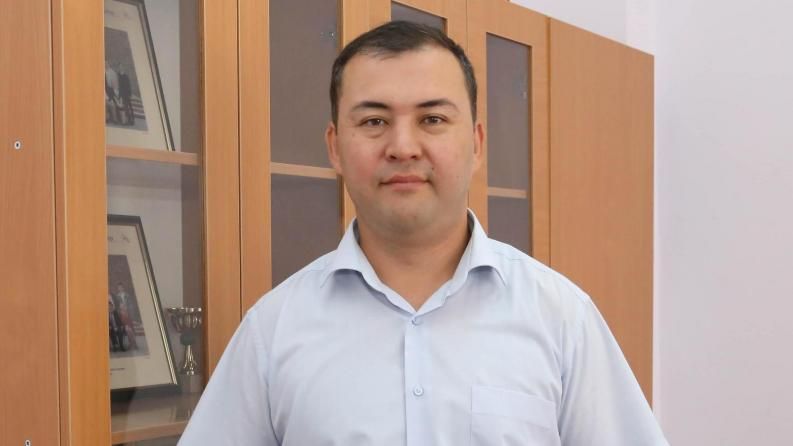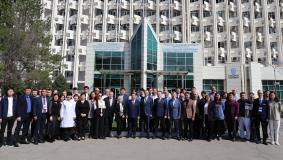Timur Umarov: “Learning will become more difficult, but it will be easier to find a good job”

July 1, Timur Faridovich Umarov was appointed as Director of the Institute of Information and Telecommunication Technologies (hereinafter IITT). In an interview, he told the correspondent of Satbayev University portal what should we expect in the near future.
Question: “Tell us about yourself. What kind of tasks will you do as director of IITT?”
Answer: “I started my academic career at the Kazakh-British Technical University, where I was in charge of academic activities and development of the IT direction in general. Recently, Iskander Beisembetov, the rector of Satbayev University, invited me to take the post of director of the Institute of Information and Telecommunication Technologies. The main tasks of my work in here will be the further modernization of the institute, the improvement of the substantive part of educational programs, as well as their international recognition.”
“What is happening in the field of IT now? And what are you planning to undertake in order to prepare students for these changes?”
“As you know, in the IT industry, changes are occurring very quickly, and now we are forced to work proactively in order to keep pace with the innovations offered by the countries-legislators of the industry. For that end, such areas as big data analytics and information security are very actively developing in our institute. The skills of a good programmer or software engineer are no longer optional specific skills, but have become a necessary and sufficient condition for successful employment. Over the past years, there has been an aggressive convergence of information technology and telecommunications, which leads to an increased interest in the field of development and maintenance of various kinds of mobile applications. At the same time, the amount of generated data (text, graphic, audio, video, etc.) is growing exponentially; it is necessary to train students in methods and techniques of analysis. Therefore, we modernize our programs and strengthen the essential mathematical part. The fundamental disciplines such as the Theory of Probability and Mathematical Statistics, linear algebra, etc. are very important. We also plan to start working closely with schools and offer them our students as teachers. This will contribute to a deeper technical preparation of pupils for higher education. With regard to the general educational process at the institute, we will raise requirements for students from year to year.”
“What kind of work with students do you plan to do?”
“As a director, I believe that the management of the institute should be open to students. I abided by the same principle when I was a dean of the IT-faculty at KBTU (Kazakh-British Technical University). Any student can get in touch with me and share their plans and ideas. I welcome any student initiative aimed at their professional development, and above all, the desire of students to participate in various types of competitions. I am ready to support them in every way, provide additional classes and invite experts, send them to trainings and meetings, attract sponsors, etc. In addition, it is very important to involve students in scientific work. To do that it is necessary to invite them to seminars held by candidates for a doctor’s degree, our professors and visiting professors, to share experience and knowledge. Special attention will be paid to Olympiads, they have a positive impact on the career of our graduates. Perhaps the most prestigious Olympiad in the world is International Collegiate Programming Contest, organized under the aegis of the Association for Computing Machinery (ACM). The victory in this Olympiad or even just participation opens the doors to large global IT companies. The majority of Kazakhstani people, which are working in Silicon Valley (California, USA), got there through participation and victories in the Olympiad in sports programming.”
“That is to say, your main attention will be directed to the preparation for olympiads?”
“Primarily, we will consider the desires of our students. After all, someone wants to take part in the Olympiads, another one wants to lose himself in science, the third one wants just get a degree. It is important to look closely at students who could “shoot” in the future. We will create a special section at our institute for those who want to take part in the Olympiads. It will operate under the guidance of Master's Degree Students and PhD students. The section will oversee all olympiad work, monitor and analyze successes and failures. I agree that in the first year or so we will not even go through qualifying rounds, but at a certain point it will happen and we will raise the prestige and rating of our institute.”
“What place will the students' career take in your work?”
“Very significant. Employment is an important parameter of the educational program. Therefore, we will encourage good students and those who practice their professions. If a student works in a company of his special field, performs various IT projects, writes software products and at the same time has a high GPA, this student will receive flexible attendance status. This places additional responsibility on him, the student will have to study the lectures by himself, keep in touch with professors, receive tasks and perform them on time. However, at the same time he will have valuable work experience. Our purpose is 100% of employment of graduates and their full professional and linguistic readiness for further study opportunities and overseas employment. And nothing but these results can show that we are on the right track.”
“Do you have any links with companies that will help your graduates to find a job?”
“Yes, the institute has well-established connections with IT-companies, where later our graduates go. We need to continuously track the quality of teaching to be confident in our graduates’ background. The substantive content of the subjects should also be reconstructed so that graduates would be ready for the requirements and tasks of Kazakh and international labor markets. After all, the reputation of professors, the institute and the whole university depends on how our graduates will work.”
“Do you plan any actions that will help to achieve this goal?”
“Our tasks for the next 2 or 3 years include obtaining ABET accreditation. The Accreditation Board for Engineering and Technology is an agency based in Baltimore, Maryland, USA. The structure of ABET includes more than 80 thousand engineering and technical specialists (eminent professors of US universities, practitioners and experts from this industry). Today ABET is the most recognizable accreditation of technical field all over the world. Almost all universities in the United States accredited their technical specialties in this agency. It will be my responsibility to inform all professors and heads of departments of the institute of the accreditation method. We have to be patient, because preparation will take about 2 to 3 years. Experience shows, not every university manages to get ABET accreditation from the first time. Presentation of our first self-assessment report will only be possible in 3 years. And during this time we need to do a lot of homework.”
“What will you get after ABET accreditation as a result?
“We will gain worldwide recognition and trust from the international engineering community. This will give obvious advantages to our graduates. Graduates who have completed an ABET-accredited program are more likely to get into foreign universities to continue their studies and get a job anywhere in the world. I remember when this accreditation really helped KBTU graduate to undertake a Master’s Degree Program of the Technical University of Munich. As you know, this is one of the top universities in Europe. Another KBTU graduate got a discount at a university in Australia. We are proud that among all CIS countries ABET-accredited programs exist only in Kazakhstan and want to continue to have this advantage.”
“Will it affect the quality of teaching?”
“This has an impact on the content of subjects, on monitoring process of student performance, the quality of our program and the overall educational level. It also influences how we respond to the recommendations from employers and graduates. After all, their valuable feedback often helps us to find a way to keep moving on!”
“Will it be harder to learn?”
“Yes, it will be harder to learn. And not only to learn, but also to teach. Every day the volume of knowledge increases. While maintaining the quality of theoretical training, we need to seek to give more practical skills. We need to enhance nteraction between students and professors. So to teach students in small groups will be much more advisable concerning the quality of education. This work should be aimed at enhancing the credibility and trust for the University. Moreover, everyone who works and studies in our institute should maximally enjoy doing their activities. And I will be very happy to learn something new from my colleagues. But my greatest accomplishment in this work will be thankful graduates who will just say “Thank you!” to conveyors of knowledge, professors and authorities.”
Timur Umarov, holder of a PhD with a degree in Computer Science, graduated from King's College London (UK). From 2004 to 2018, he worked at the Kazakh-British Technical University. ABET expert in Computer Science, Information Systems and Information Technology. Active member of well-known technical and engineering associations and communities: CSAB, ACM and IEEE (USA). The visit of Timur Umarov as an expert at the ABET Commission at one of the US universities to accredit their Computer Science educational program is scheduled in the period from September 30 to October 5, 2018.




